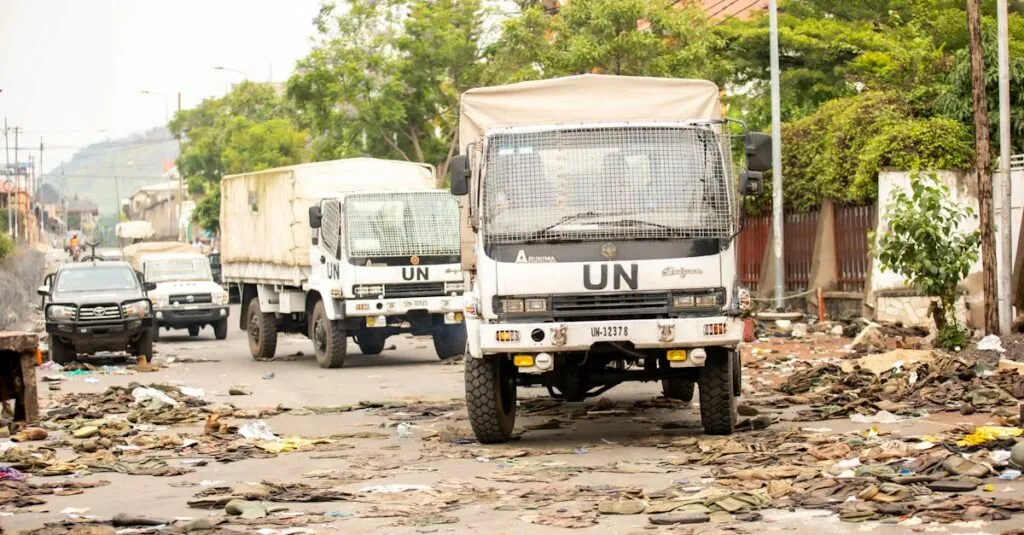Table of Contents
ToggleIn a world where news travels faster than a cat meme, global affairs shape our lives more than ever. From trade wars to climate change, these issues don’t just make headlines—they impact our daily routines, our wallets, and even our Instagram feeds. It’s no longer just about what’s happening in your backyard; it’s about the entire neighborhood, and that neighborhood is the globe.
Navigating the complexities of global affairs can feel like trying to assemble IKEA furniture without instructions. But fear not! Understanding these vital topics doesn’t have to be a daunting task. With a little humor and a sprinkle of insight, anyone can become a savvy global citizen. So buckle up as we dive into the whirlwind of international relations, trade agreements, and diplomatic shenanigans that keep our world spinning.
Overview of Global Affairs
Global affairs encompass the intricate web of political, economic, and social interactions between countries. Trade wars significantly affect global economies, influencing prices, availability of goods, and international relations. Climate change represents another critical issue, prompting nations to collaborate on environmental policies and sustainability efforts.
International organizations, like the United Nations, facilitate cooperation among countries, addressing common challenges. Regional partnerships, such as the European Union, focus on economic integration and shared regulations. Diplomacy plays a crucial role in resolving conflicts and fostering peaceful relationships among nations.
Trade agreements often shape economic landscapes by lowering tariffs and promoting commerce. These agreements, such as NAFTA or the Trans-Pacific Partnership, help streamline trade processes and boost economic growth. Understanding these frameworks empowers citizens to engage in discussions and advocate for policies that align with national interests.
Global migration patterns also reflect the complex interplay of factors like war, economic opportunity, and environmental changes. Migrants contribute to cultural diversity, but their movements can challenge existing socio-political systems. As nations grapple with these realities, public policies must adapt to support integration and social cohesion.
Emerging technologies influence how global affairs unfold. Social media platforms serve as tools for information dissemination, shaping public perception and mobilizing grassroots movements. Understanding the role of technology in driving change helps individuals grasp the dynamics of global communication and activism.
Active engagement in global affairs fosters informed citizenship. By staying informed on these topics, individuals contribute to creating a more interconnected and responsive world. Balancing national interests with global responsibilities remains essential in navigating the complexities of today’s geopolitical landscape.
Key Issues in Global Affairs
Global affairs encompass many pressing issues that shape the interconnected world. Awareness of these matters influences global citizenship and promotes informed engagement.
Climate Change and Sustainability
Climate change poses a severe threat, impacting ecosystems and weather patterns. Nations need to develop sustainable policies to mitigate environmental damage. Collaborative efforts, such as the Paris Agreement, unite countries in fighting climate change. Renewable energy sources play a key role in reducing carbon emissions and promoting sustainability. Citizens often advocate for environmental protection, calling on governments to prioritize climate initiatives. Ongoing scientific research informs policies that address climate-related challenges and emphasize the importance of protecting natural resources.
International Trade and Economics
International trade significantly influences economic stability across nations. Trade agreements lower tariffs, enhancing market access for goods and services. Countries that embrace free trade often experience economic growth and increased consumer choice. Disputes, such as trade wars, disrupt markets and can lead to increased prices for consumers. Economies also rely on export competitiveness to benefit from global interconnections. Various economic organizations, like the World Trade Organization, play a crucial role in regulating international trade practices.
Human Rights and Social Justice
Human rights remain a foundational element in global affairs, demanding respect and protection. Various advocacy groups work tirelessly to promote social justice and equality worldwide. Discrimination, whether based on race, gender, or sexuality, challenges societies and requires concerted efforts for change. Critical discussions around human rights attract global attention, pushing governments to address injustices. International treaties, such as the Universal Declaration of Human Rights, set standards for ethical behavior among nations. Mobilization for justice often takes place through grassroots movements, harnessing collective power for positive transformation.
The Role of International Organizations
International organizations play a crucial part in shaping global affairs. They facilitate cooperation among nations, addressing complex issues on multiple fronts.
United Nations
The United Nations (UN) serves as a global platform for dialogue and cooperation. Established in 1945, it promotes peace, security, and development. Countries engage in discussions to resolve conflicts and uphold human rights standards. The UN’s various agencies, like UNICEF and WHO, work on issues ranging from children’s welfare to health crises. Coordination among nations is vital for tackling challenges such as climate change, pandemics, and humanitarian crises. The UN’s initiatives help unite disparate efforts into comprehensive strategies, helping to improve global stability.
World Trade Organization
The World Trade Organization (WTO) regulates international trade, ensuring smooth commerce between member countries. Created in 1995, its primary purpose is to foster economic growth through fair trade practices. Countries negotiate trade agreements that lower tariffs and eliminate trade barriers. Dispute resolution mechanisms play a critical role in maintaining order and addressing grievances. Global economic stability hinges on the WTO’s efforts, as thriving trade relationships lead to job creation and development. Proponents argue that embracing free trade ultimately benefits consumers and producers alike.
Major Global Players
The landscape of global affairs includes several major players, each influencing international relations, trade agreements, and security dynamics.
United States
The United States holds significant sway in global matters due to its economic power and military presence. This nation sets trade policies that impact worldwide markets. It also leads initiatives addressing climate change and human rights, often driving international coalitions. Recognition of its leadership in organizations like the United Nations reinforces its influence on diplomacy. U.S. foreign aid plays a crucial role in supporting development and humanitarian efforts, establishing partnerships across continents.
China
China’s rapid economic growth positions it as a formidable global player. The Belt and Road Initiative exemplifies its commitment to enhancing trade infrastructure and connectivity. China actively participates in multilateral organizations, seeking to shape international norms and standards. Its investments in renewable energy demonstrate a growing focus on sustainability in response to global climate commitments. Tensions in trade relations with the United States highlight the complexities of its global positioning. National security concerns further shape its engagements, particularly in Asia-Pacific regions.
European Union
The European Union serves as a unique political and economic entity, fostering unity among member states. Trade agreements forged by the EU influence global commerce, promoting standards for goods and services. Environmental policies highlight its commitment to sustainability, aiming for ambitious climate goals. The EU also plays a critical role in human rights advocacy, setting regulations that member countries must follow. Diplomatic efforts strengthen its role in global conflicts, seeking peaceful resolutions through negotiations. Investments in technology and research enhance its competitive edge on the world stage.
Navigating the complexities of global affairs is essential for fostering informed global citizens. As individuals engage with pressing issues like climate change and international trade, they contribute to a more interconnected world. Understanding these dynamics not only enhances awareness but also empowers people to advocate for meaningful change.
Active participation in discussions surrounding human rights and sustainability can drive progress and inspire collaboration among nations. By staying informed and involved, individuals can play a pivotal role in shaping a future that balances national interests with global responsibilities. Embracing this knowledge creates opportunities for dialogue and action that benefit both local communities and the world at large.







